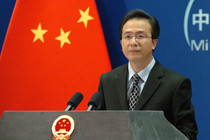China ‘notices’ PH diplomatic gesture in maritime dispute
The Chinese foreign ministry has confirmed the “restoration of diplomatic contact” between Manila and Beijing as the two sides try to work out a solution to their dispute over Scarborough Shoal in the West Philippine Sea (South China Sea).
In a report posted on its website, the Chinese Embassy in Makati City quoted remarks made by Hong Lei, the spokesman of the Chinese foreign ministry, during a May 10 press conference in the Chinese capital.
Hong had told reporters, “We have noticed the Philippine Department of Foreign Affairs’ restoration of diplomatic contact with the Chinese Embassy in the Philippines.”
However, he did not make any further comments about the resumption of consultations between the two sides.
Instead, Hong said “China has reiterated its position to the Philippines, demanding it to respect China’s sovereignty over the Huangyan Island (Scarborough Shoal) and refrain from any acts that may complicate or magnify the situation.”
“We will closely monitor the situation and the actual actions of the Philippines,” he also said.
At the same time, Hong assailed Manila for allegedly making “strong-worded remarks on the Huangyan Island issue to play up public feelings, which seriously undermine the atmosphere of China-Philippines relations.”
“The Philippines has also incited domestic public and overseas nationals to stage anti-China protests. Such behaviors have triggered strong reaction and concerns from the Chinese people at home and abroad. We hope the Philippines will not do further damage to bilateral relations,” he said.
According to Hong, China “is highly concerned about the safety of Chinese nationals and institutions in the Philippines.”
“We demand the Philippines to take effective measures to earnestly protect the safety and legitimate rights and interests of Chinese citizens and institutions in the Philippines,” he added.
The Chinese government-run China Daily, meanwhile, quoted Tong Xiaoling, Beijing’s envoy to the Association of Southeast Asian Nations (Asean), that China has “continued to urge the resumption of dialogue” between the two sides.
On Saturday, Foreign Secretary Albert del Rosario told the Inquirer the two sides had resumed consultations earlier last week to break the stalemate.
The good news from Del Rosario came as Malacañang reiterated that the government had no hand in the anti-China protests in Manila and other capital cities worldwide on Friday.
The DFA did not disclose the negotiation points but going by China’s “requirements,” as Hong mentioned in his talk with journalists in Beijing, the consultations would lead to, at best, temporary agreements that would allow the two sides to disengage without losing face.
China’s demands, said Hong, were that Chinese public service ships at the shoal be not disturbed, that Chinese fishing boats be left alone to go about their normal activities, and that Philippine vessels leave the shoal, which China calls Huangyan Island.
On the other hand, the Philippines refers to the rock formation as Bajo de Masinloc and Panatag Shoal.
Del Rosario did not say how Manila would respond to those demands. But he indicated that both sides did not expect to reach a lasting solution to the dispute this early.
In a text message, he said “a diplomatic result ending the current impasse in Bajo de Masinloc, which we hope can be achieved, will at best be a temporary one. Ultimately, we will need an overall solution.”
According to Del Rosario, the Philippine side “is moving forward with the legal track as a durable solution to our disputes in the West Philippine Sea.”
Stressing the need to “pursue a peaceful resolution” of the conflict with China, he said the DFA would follow a three-track approach: political, through the Asean; legal, through the United Nations Convention on the Law of the Sea (Unclos) settlement; and diplomatic, through continuing consultations to defuse the current situation at Scarborough Shoal.
Del Rosario has repeatedly asserted that abiding by the rules set by the Unclos was the legitimate way of dealing with conflicting and overlapping claims in the West Philippine Sea.
Scarborough Shoal is located some 220 kilometers west of Zambales, but China insists it is Chinese territory even though the nearest Chinese land mass is more than 500 kilometers away.
The DFA head had earlier said the Philippines would unilaterally bring the dispute to the Hamburg, Germany-based International Tribunal on the Law of the Sea following Beijing’s rejection of Manila’s proposal for international arbitration.
